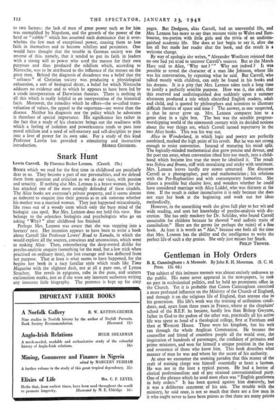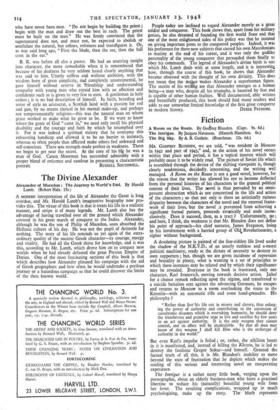Gentleman in Holy Orders
THE subject of this intimate memoir was almost entirely unknown to the public. His name never appeared in the newspapers, he took no part in ecclesiastical politics, and he held no prominent office in the Church. Yet it is probable that Canon Cunningham exercised a more profound influence on the Ministry of the Church of England, and through it on the religious life of England, than anyone else in his generation. His life's work was the training of ordination candi- dates, and, apart from three years in France, where at the chaplains' school of- the B.E.F. he became, hardly less than Bishop Gwynne, father in God to the padres of the other war, practically all his active life was spent as head of a theological college, first at Farnham and then at Westcott House. These were his kingdom but his writ ran through the whole Anglican Communion. He became the counsellor and friend of countless people all the world over, the inspiration of hundreds of parsonages, the confidant of primates and prime ministers, and won for himself a unique position in the love and reverence of those who knew him. This book describes what manner of man he was and where lay the secret of his authority.
At once we encounter the seeming paradox that this master of the craft of training clergy was himself essentially at heart a layman. He was not in the least a typical parson. He bad a horror of clerical professionalism and of arty strained conventionalised piety. One of the phrases which he used most often was " English gentlemen in holy orders." It has been quoted against him desisively, but it was a deliberate statement of his aim. The trouble with the ministry, he said once, is not so much that there are a few men in it who ought never to have been priests as that there are many priests
who have never been men. " Do not begin by building the priest ; begin with the man and draw out the best in each. The priest must be built on the man." He was firmly convinced that the supernatural does not, and must not, be expected to abolish or annihilate the natural, but refines, enhances and transfigures it. Or, as was said long ago, " First the blade, then the ear, then the full corn in the ear."
B. K. was before all else a pastor. He had an unerring insight into character, the more remarkable when it is remembered that because of his deafness he very seldom heard clearly anything that was said to him. Utterly selfless and without ambition, with the wisdom born of great simplicity, and completely unsentimental, he gave himself without reserve in 'friendship and understanding sympathy with young men who repaid him with an affection and confidence such as is given to very few to earn. A gentleman in holy orders ; it is no bad description of himself. In birth, breeding and sense of style an aristocrat, a Scottish laird with a passion for rod and gun, by no means clerical in his mental make-up, and perhaps not temperamentally religious—this was the natural man on whom grace worked to make what he grew to be. If we want to know where the grace of God " came in," we need only recall his physical disability and the courage and faith by which he triumphed over it. For it was indeed a spiritual victory that he overcame this exhausting handicap and allowed it to be no barrier to intimacy, whereas so often people thus afflicted make others feel awkward and self-conscious. There was strength made perfect in weakness. There we begin to get near the secret. At the core of his liff he was a man of God. Canon Moorman has succeeded admirably with a proper blend of reticence and candour in presenting a characteristic































 Previous page
Previous page